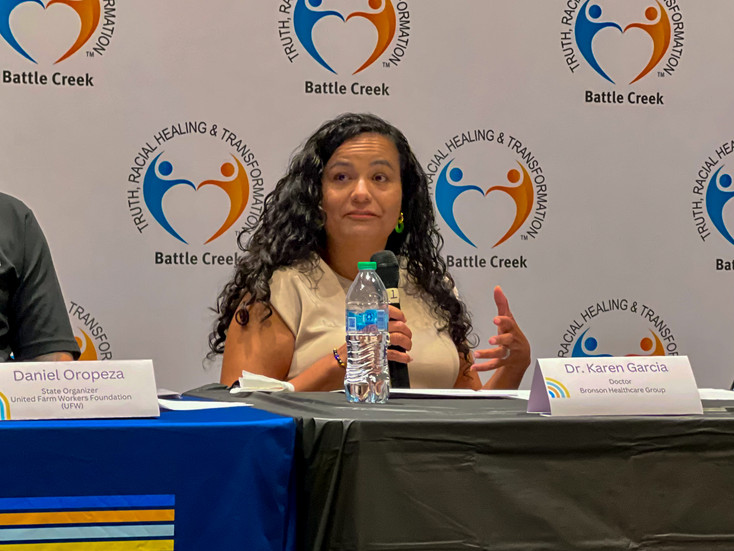Battle Creek panelists put immigration in focus
- Nick Buckley
- Jun 3, 2025
- 7 min read
Nonprofit BCTRHT hosts community conversation centered on shared humanity
Nick J. Buckley for BCTRHT
Amid an evolving socio-political climate shaping immigration policy and affecting immigrant communities, panelists from various sectors came together in downtown Battle Creek to share perspectives and engage with residents.
The Battle Creek Coalition for Truth, Racial Healing, and Transformation (BCTRHT) hosted “Immigration in Focus” on Thursday, May 29 at the Kool Family Community Center to highlight the experience of immigration and underscore the need to better understand and support immigrant communities.
“It's about hearing directly from people inside the systems; education, healthcare, law, labor and organizing. And most importantly, it's about what each of us can do to support and protect our immigrant neighbors,” said Elizabeth Garcia, Co-Executive Director for BCTRHT. “These systems are complex. They don't exist in isolation. They overlap, influence one another and carry generations of history. But even in that complexity, we still have agency. We can take action. We can respond.”
The panel consisted of Battle Creek Police Chief Shannon Bagley; Lisa Gardner, coordinator for multilingual learners at Battle Creek Public Schools; Christina Khim, executive director of the nonprofit Burma Center; Dr. Karen Garcia, pediatrician and executive fellow at Bronson Healthcare; Daniel Oropeza, Michigan organizer for the United Farm Workers Foundation; and Elizabeth Santana, managing attorney at the Michigan Immigrant Rights Center.
Panelists emphasized the importance of culturally competent services, accessible language support, and elevating immigrant voices. They also addressed the complexities of U.S. Immigration and Customs Enforcement (ICE) detention and the critical need to uphold due process.
LEGAL SERVICES
Confronting the challenges of a complex and often confusing immigration system, Santana urged migrants without legal status to educate themselves about their rights. She emphasized that “people are not illegal” and reminded the audience that “everyone has rights, regardless of immigration status.”
“They can go to family court if they need a divorce or for child custody. They can initiate civil lawsuits. They can initiate employment violations,” Santana explained. “There's also the right to hold police and ICE to their legal burdens… Law enforcement can only enter a private space in one of two ways: They need to have a judicial warrant signed by a judge, or you give them permission.”
Santana also addressed the recent passage of House Bill 4339 by the Michigan House of Representatives, which seeks to ban so-called “sanctuary cities.” The bill would prevent counties from adopting or enforcing any laws, ordinances, policies, or regulations that limit cooperation between local and federal officials regarding an individual's immigration status.
“In Michigan, there is no sanctuary jurisdiction. There is no legal definition of what that means,” Santana said. “People are scared. Municipalities that otherwise might have wanted to create policies to uphold the rights of their immigrant community members feel scared of retaliation for actions like this.”
LAW ENFORCEMENT
Bagley responded to concerns about undocumented residents who call 9-1-1 with an emergency, saying they are treated the same as any other caller, regardless of legal status.
“We are here to serve and protect this community, regardless of your status. That's not a question that we're concerned about,” Bagley said. “Our primary focus is, how do we serve? How do we keep people safe? And how do we interact so that we're viewed as a resource to plug in to other people or other resources to solve problems within our community.”
Bagley highlighted the Community Fusion Center as a non-emergency resource for residents. This collaborative initiative, involving both civilians and public safety officers, works to bridge communication and information gaps, fostering stronger relationships among all community stakeholders.
“This is about relationships with our community,” Bagley said. “We don’t ask what your status is, we care about relationships… I would say it's our calling to make sure we do everything in our power that this community is safe and that we provide the service and the resources that we can make everyone feel safe.”
EDUCATION
Gardner noted that immigrant children face numerous challenges, such as cultural differences and language barriers, making it essential for schools to build meaningful connections with both students and their families.
“We have parent liaisons in Spanish, Burmese and Swahili,” Gardner said. “When students and families come that don't speak English, we immediately connect them with our parent liaisons to help with registration, to help with navigating school. And once they're placed in school, we put them with bilingual tutors and other staff members that speak their language and know their culture, so they don't feel alone or isolated.”
The prospect of ICE agents entering school buildings has stirred fear and uncertainty in communities across the country. Battle Creek Public Schools has shared its protocols should ICE agents enter a school building.
“We let them in to the main office, where they are met by the building leader and they are immediately instructed to go to central office so they can they leave the school,” Gardner said. “Because of FERPA laws - Family Educational Rights and Privacy Act - we are to give no information on children and their legal status or their families whatsoever.”
NONPROFIT
Khim said the Burma Center supports Burmese immigrant and refugee families, especially those with temporary protective status (TPS), green cards or visas, helping them navigate complex systems like immigration, housing, work and education.
“At the Burma Center, we help them work with an immigration attorney to provide help for green card applications, work permit renewal and citizenship application,” Khim said. “So we work with them, to support and empower them so they can continue building their new life here.”
An immigrant herself, Khim stated that it is vital for the immigrant community to share its stories and highlight the positive contributions it makes in the country and the community.
“Think about the resilience and the work ethic that we bring to this economy,” Khim said. “Let's create spaces that not only include immigrant voices, but center them. And what I mean by that is hiring them, funding their ideas, elevating their stories, challenging systems and policies that exclude them or harm them. Celebration also looks like language access, culturally competent services and representation in leadership. Let's be intentional and strategic.”
AGRICULTURE
The UFW Foundation advocates farmworker rights across the nation, including educating communities on their rights and the collective power in organizing. Oropeza emphasized the importance of recognizing both the contributions of migrant farm workers and the challenging conditions they often endure. According to the National Institute of Health (NIH), migrant farm workers have an average life expectancy of 49 years.
“Stop saying, ‘They are stealing their jobs,’ because that's a whole different ball game,” Oropeza said. “It’s not stealing. It’s because you don't want to do something that you can do but you don't want to do.”
Oropeza also addressed the common misconception that migrant farm workers are exclusively from Latin American countries. While a large portion of the U.S. agricultural workforce does come from Mexico and Central America, migrant farm workers also come from regions such as Africa, Asia and Eastern Europe.
“We need to educate the farm workers, regardless of what language they speak,” Oropeza said. “We must build relationships with these workers... We give them our WhatsApp number or our hotline number. They can call us and leave messages with us in whatever language, and it's our duty to follow up with them.”
HEALTHCARE
Dr. Karen Garcia highlighted the importance and value of health professionals providing culturally congruent care for every patient.
“At Bronson specifically, we're continually working to create environments that are welcoming and culturally responsive, and we're continuing to really push for additional training for our staff, especially around trauma, informed care and leading into cultural humility,” Karen Garcia said. “We want to build trust within the communities that are most marginalized, and we want to make sure that all individuals and families feel safe when they come and they seek care from us.”
Karen Garcia added that all patient information is handled with the highest level of confidentiality as medical professionals are required to follow patient privacy laws under the Health Insurance Portability and Accountability Act (HIPAA).
“We've seen what happens when parents who have had to delay care for their sick children, or even when individuals have skipped their own follow up visits for chronic conditions like diabetes or hypertension; fear creates a hidden burden,” Karen Garcia said. “It can lead to preventable illness, more expenses, emergency care and poorer outcomes for all, both the adults and the children in our community. And when we lower barriers, whether it's through language access, transportation, health or simply ensuring that people feel seen and respected, we see better health outcomes for everyone, because access to care should be based on human dignity.”
CALL TO ACTION
The event closed with a call to action, encouraging attendees to use their knowledge to advocate for meaningful change within their communities.
“Change happens in moments like this,” Elizabeth Garcia said. “When we pause, listen deeply and let what we learn guide us.”
####
About the Battle Creek Coalition for Truth, Racial Healing, and Transformation (BCTRHT): The Battle Creek Coalition for Truth, Racial Healing, and Transformation (BCTRHT) is a nonprofit organization that serves as a convener, connector, and catalyst for the racial equity movement in Battle Creek. BCTRHT works to transform how the community lives, works, and interacts — centering truth, shared humanity, and healing as the foundation for lasting change.
Launched in 2017 as part of the national Truth, Racial Healing, and Transformation™ movement created by the W.K. Kellogg Foundation, BCTRHT is rooted in a shared vision to address the enduring impacts of racism and build a more equitable future.
To learn more, visit bctrht.org, follow BCTRHT on Facebook, or contact info@bctrht.org for media inquiries or collaboration opportunities.
MORE INFORMATION
Battle Creek TRHT: https://www.bctrht.org/
Battle Creek Police Community Fusion Center: https://www.battlecreekmi.gov/769/Community-Fusion-Center
Burma Center: https://www.burmacenterusa.org/
Michigan Immigrant Rights Center: https://michiganimmigrant.org/
United Farm Workers Foundation: https://www.ufwfoundation.org/; Michigan Hotline: 269-308-4025; Text program Si Se Puede to 877-877; Call Center 1-877-881-8281












